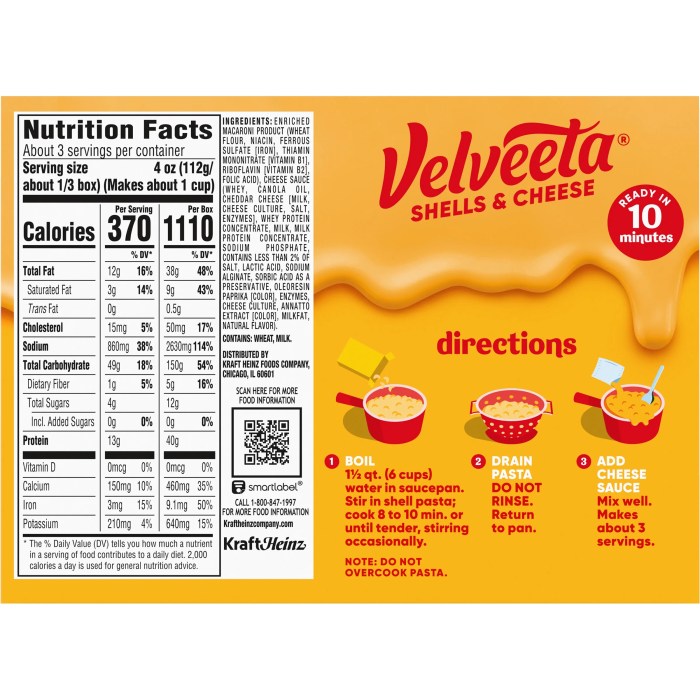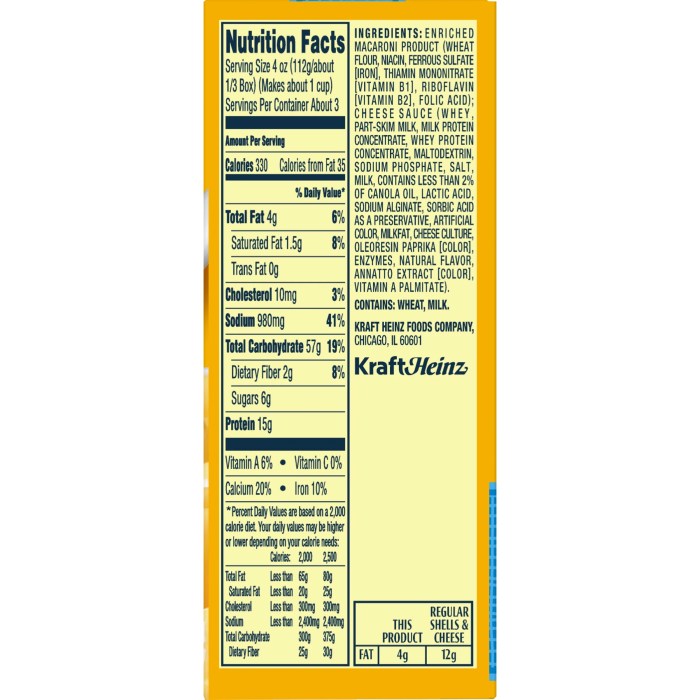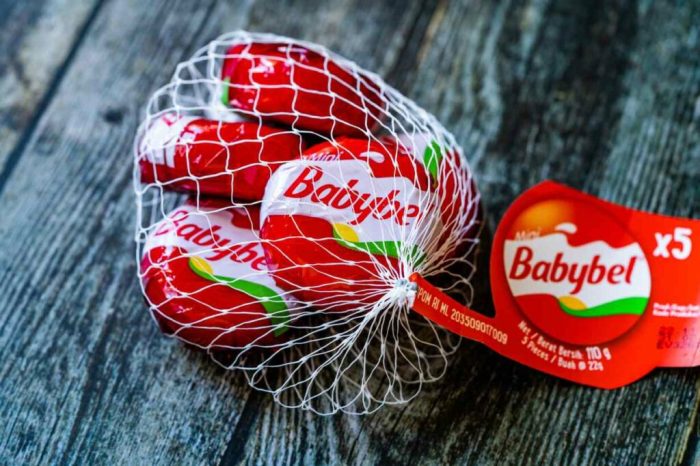Velveeta Cheese and Dietary Concerns: Velveeta Cheese Nutrition Information

Velveeta cheese nutrition information – Let’s face it, Velveeta. It’s the processed cheese that dares to be cheesy. But like a mischievous kitten batting at a yarn ball of dietary complexities, it presents some interesting nutritional considerations. This section delves into the potential pitfalls and triumphs of incorporating Velveeta into various dietary plans. Prepare for some surprisingly insightful (and hopefully, amusing) facts.
Velveeta and Low-Sodium Diets
Velveeta, with its famously smooth and creamy texture, isn’t exactly a champion of low-sodium eating. One serving packs a considerable sodium punch, making it a less-than-ideal choice for those carefully monitoring their sodium intake. Individuals on strict low-sodium diets should exercise extreme caution and possibly limit or exclude Velveeta from their culinary adventures. Remember, moderation is key – unless you’re a sodium-loving superhero, in which case, carry on!
Sodium Content Comparison of Velveeta and Other Processed Cheeses
To better illustrate Velveeta’s sodium standing, let’s compare it to some fellow processed cheese contenders. The following table provides a snapshot, though values can vary slightly depending on the specific product and serving size. Always check the nutrition label on the package for the most accurate information. (Note: Data sourced from various reputable nutrition databases and product labels.
We’ve done our best, but don’t blame us if your local grocery store’s Velveeta is slightly different!)
| Cheese Type | Sodium (mg per serving) | Serving Size | Sodium per 100g |
|---|---|---|---|
| Velveeta (example) | 260 | 28g | 930 |
| Processed Cheese Slice A (example) | 180 | 28g | 640 |
| Processed Cheese Spread B (example) | 150 | 30g | 500 |
| Another Processed Cheese C (example) | 200 | 30g | 670 |
Velveeta Allergens and Their Implications
Velveeta, like many processed cheeses, contains milk. This makes it a definite no-go for individuals with milk allergies. A severe allergic reaction can range from mild discomfort to a life-threatening situation. Always check the ingredient list for potential allergens and, if you have any doubts, consult with a healthcare professional or allergist before indulging. Better safe than sorry – especially when cheese is involved.
Velveeta and Saturated Fat Content
Ah, saturated fat – the culinary villain many love to hate. Velveeta, being a processed cheese, contains a notable amount of saturated fat. Excessive saturated fat intake is linked to increased levels of LDL cholesterol (“bad” cholesterol), which can contribute to cardiovascular issues. While a slice or two of Velveeta might not cause immediate harm, regular, excessive consumption should be approached with caution, especially for those with pre-existing cardiovascular concerns.
Understanding Velveeta cheese nutrition information is crucial for mindful eating. A key factor influencing the overall nutritional profile of a dish made with Velveeta is the addition of other ingredients, such as bread. For example, the nutritional impact significantly increases when considering a grilled cheese sandwich, as seen in a detailed breakdown of grilled cheese sandwich nutrition facts.
Therefore, analyzing Velveeta’s nutritional content should always consider the context of its use within a recipe.
Balance is key – remember that broccoli exists (and tastes surprisingly good with Velveeta… just kidding… maybe).
Velveeta Cheese in Different Diets

Let’s face it, Velveeta isn’t exactly known for its nutritional prowess in the same way kale is. However, like a surprisingly charming villain in a cheesy movie, it can find its place in a balanced diet, albeit with a bit of strategic maneuvering. It’s all about moderation and understanding its nutritional profile.Velveeta’s role in various dietary plans depends largely on the individual’s overall dietary goals and how it’s incorporated.
While it shouldn’t be the cornerstone of any healthy eating plan, it can be a fun, occasional addition.
Velveeta Cheese in a Balanced Diet
Velveeta, despite its processed nature, can be incorporated into a balanced diet in moderation. Think of it as a flavorful condiment rather than a main course. A small amount added to a well-rounded meal, rich in fruits, vegetables, lean protein, and whole grains, won’t derail your healthy eating efforts. The key is portion control. Remember, even the most virtuous of foods can be detrimental in excess! A few slices on a sandwich or a small amount melted into a healthy chili, for example, can add flavor without significantly impacting the overall nutritional value.
Velveeta Cheese in Ketogenic and Low-Carb Diets, Velveeta cheese nutrition information
Velveeta’s relatively high fat content and low carbohydrate count make it surprisingly compatible with ketogenic and low-carb diets. However, it’s crucial to remember that portion sizes remain paramount. While Velveeta contributes to the necessary fat intake for these diets, it’s also processed and contains sodium, so it should be consumed mindfully as part of a broader plan that includes other keto-friendly foods.
Over-reliance on processed cheese will negate any benefits.
Velveeta Cheese in Vegetarian Diets
For vegetarians, Velveeta can provide a convenient source of protein, albeit not the most nutritionally complete one. It can be used sparingly in vegetarian dishes to add creaminess and flavor. However, vegetarians should prioritize other sources of protein, such as beans, lentils, tofu, and nuts, for a more balanced and complete nutritional profile. Velveeta should be viewed as a supplementary addition, not a primary protein source.
Nutritional Comparison: Velveeta vs. Natural Cheeses
The following table compares the nutritional profile of Velveeta with that of some common natural cheeses. Note that values can vary slightly depending on the specific brand and type of cheese. This is just a general comparison to illustrate the differences.
| Cheese Type | Fat (g per 1 ounce) | Protein (g per 1 ounce) | Calories (per 1 ounce) |
|---|---|---|---|
| Velveeta | 8 | 6 | 100 |
| Cheddar | 9 | 7 | 115 |
| Mozzarella | 8 | 6 | 85 |
| Swiss | 8 | 7 | 100 |
Essential Questionnaire
Is Velveeta gluten-free?
Generally, yes, but always check the label to be sure, just in case.
Can Velveeta be part of a healthy diet?
In moderation, sure! It’s not a health food, but a little won’t kill ya. Balance is key!
Does Velveeta have any dairy alternatives?
Nope, it’s straight-up dairy. No vegan Velveeta (yet!).
How does Velveeta compare to cheddar cheese nutritionally?
Velveeta tends to be higher in sodium and lower in some nutrients compared to cheddar. Cheddar usually has more protein and less fat.


